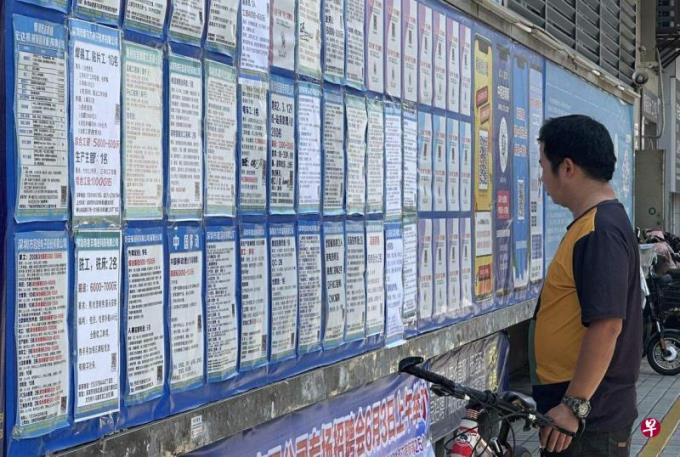
The balance of supply and demand in China's labor market is facing pressure, including catering, manufacturing, and high -tech industries facing the dilemma of "finding" and "recruitment" in the company, and the structural contradiction between employment continues to expand.
In Shenzhen shopping malls and streets, it is not difficult to see many catering companies recruit kitchen assistants, chefs, miscellaneous workers, waiters and other employees.Many catering companies appealed to reporters that the recruiter of the industry is becoming more and more difficult after the epidemic. Even if they have paid a higher salary than in previous years, there are still positions for a few months to apply for a few months.
Ms. Liu, a cooked food industry, lamented: "Miscellaneous workers in the restaurant are really difficult to ask. Last year, I was 3,000 yuan (RMB, Same as the same, S $ 563) soon.People ask. Insufficient manpower, we have to stay in the store to help. "
Some industry players blame this phenomenon on people's education generally improved, and salary and work content cannot meet the requirements of job seekers.Others believe that with the prevention and control of the epidemic and the restoration of the catering industry strong, each restaurant is grabbing people, and some employees will not return to large cities after returning home during the epidemic, which leads to "labor shortage" at grassroots employees.
A survey report released by the China Hotel Association last November showed that the loss rate of the catering industry's loss rose from 19.03%before the epidemic to 20.85%after the epidemic.Among them, "low salary attractiveness" and "large job labor intensity" are the main factor of employee loss.
China's manufacturing industry is facing more complicated manpower dilemma.On the one hand, the demand for domestic and global demand has continued to weaken, and manufacturing orders have fallen. Some factories have to reduce production and suspend recruitment to reduce operating costs.On the other hand, some companies are also facing difficulties in recruitment, because more and more young people are unwilling to enter the factory.
According to official data, it is estimated that by 2025, there will be about 30 million talents in the top ten key areas of China's manufacturing industry, with a gap rate of 48%.
Mr. Chen, a recruiter of Shenzhen New Road Human Resources Company, specially recruited for the manufacturing industry, told Lianhe Zaobao that the recruitment activities of the manufacturing industry have declined significantly in the past six months.He said: "Although there are fewer positions in the factory, there are still enterprises who are recruiting. The key is that there are fewer people looking for a job. After some old employees in the factory leave, no one will make up for the human gap. Now many young people are unwilling to suffer hard work, Suspect that the work environment of the factory is poor. "
According to the survey of China Online Recruitment Platform Zhilian Recruitment, among college students who graduated this summer, the proportion of joining the manufacturing processing industry and automobile production industries is only 8.1%.However, this number has increased slightly from 6.1%last year. Driven by the current severe employment situation and the official promotion of the official, young people's mentality of the industry may have begun to change.
In addition to the catering and manufacturing industry, the imbalance between the supply and demand of talents also appears in the high -tech field.The survey shows that 25%of college students who graduated this year want to join the field of Internet, telecommunications and information and electronic technology, accounting for the highest proportion of all industries.However, in recent years, the official supervision and rectification of these industries has caused enterprises to be more cautious in recruitment, and the number of jobs has not increased significantly.
Wang Ying, deputy director of China, Huadi China, China Vice -Director of the International Professional Recruitment Consultation Service Company, pointed"Volume" culture makes professional pairing more challenging.
Recruitment consulting company: Enterprises need comprehensive talents
Wang Ying explained that with the expansion of technology companies, they need better employees to cope with the current more severe economic environment. Therefore, they have higher requirements for the soft skills of the employees and the comprehensive ability to solve the problem.Essence
She said: "The recruitment market in the field of technology has changed much in recent years. Although some talents are excellent, they generally only be proficient in work in one aspect and cannot meet the requirements of enterprises more."
Lei Sihui, deputy director of Waldz China interviewed together, for example, when some companies in Shenzhen hire the Chief Financial Director (CFO), in addition to asking candidates to have relevant financial and management knowledge and experience, they also hope that the other party has the background of entrepreneurship.Understand the operation model of startups, and these are the conditions that traditional CFOs do not have.
Wang Ying said: "(Enterprises are generally above) the result of higher requirements for talents is that they cannot recruit people, and talents cannot find jobs because the conditions do not meet their job needs, which exacerbates market manpower problems." The latest official data from China shows that in May this year, the unemployment rate of young people aged 16 to 24 rose to 20.8%, a new high for two consecutive months.Among them, the unemployment rate of Chinese college students is the subject of the unemployment population, with an unemployment rate of about 28%.Some analysts have pointed out that the disconnection of Chinese college students' skills and social needs is one of the reasons for the unemployment rate.
With the development of Chinese artificial intelligence (AI) into a new track, the demand for technical talents in this area has greatly improved.However, China's education system in this area is still immature, and the phenomenon of unbalanced talent supply and demand has intensified.
In a report in March this year in a report that the needs of enterprises in the format of AI recruitment are mainly technical positions, including algorithm engineers, natural language processing and other R & D talents, but graduates applied for posts applied for positions applied by graduates.Most of the technical positions with product managers, operations, etc. are used.
Wang Ying said that the current number of technical talents on the market is "not enough" and cannot support the expansion of the AI industry.She said that such a gap will always exist in the short term, and many companies have to turn to foreign countries to attract talents to alleviate the pressure of recruitment.




